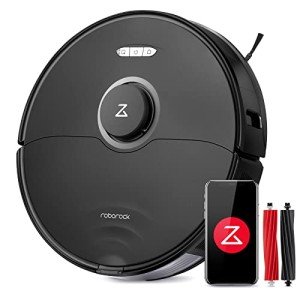10 Automated Vacuum-Related Meetups You Should Attend
The Rise of the Automated Vacuum: A Comprehensive Overview
As innovation continues to evolve, so too does the method we approach everyday jobs, including cleaning our homes. The arrival of automated vacuums, typically referred to as robotic vacuums, has changed the landscape of household chores, using a level of benefit formerly unimaginable. Robotic Hoovers dives deep into the features, advantages, obstacles, and future of automated vacuums, illuminating why they are ending up being a staple in contemporary households.
What is an Automated Vacuum?
Automated vacuums are self-operating devices created to tidy floorings while needing minimal human intervention. Geared up with sensing units, they navigate rooms, prevent barriers, and go back to their charging stations when short on battery. Many models even use programmability through mobile phone apps, allowing users to set cleaning schedules or control the vacuum from another location.
Key Features of Automated Vacuums
Feature
Description
Navigation
Uses sensors and electronic cameras to draw up areas, enabling for organized cleaning courses.
Programmable Cleaning
Users can arrange cleanings via mobile apps or pre-set timers on the device.
Smart Home Integration
Compatibility with smart home systems (e.g., Alexa, Google Home) for voice control.
Dirt Detection
Advanced designs can identify locations with more dirt and concentrate on them for deeper cleaning.
Charge Dock
Automatically returns to its charging station when battery levels are low.
Several Surface Cleaning
Can transition flawlessly in between different floor types, consisting of carpet, tile, and wood.
Benefits of Automated Vacuums
Time-Saving: Automated vacuums can considerably reduce the time invested on home tasks, making it possible for users to assign their time to more enjoyable activities.
Consistency: These gadgets provide a constant cleaning schedule, guaranteeing that dirt and dust do not have a chance to build up.
Accessibility: Individuals with mobility challenges might discover automated vacuums especially helpful, as they alleviate the physical demands of vacuuming.
Technological Innovation: Many designs come with innovative features such as app control, which enables users to keep track of and manage their vacuum from essentially anywhere.
Energy Efficient: Most robotic vacuums are developed to run effectively, using less energy than standard vacuum.
Downsides to Consider
While the advantages of automated vacuums are various, there are also some possible drawbacks:
- Cost: While prices have actually become more competitive, high-end designs can still be a substantial investment.
- Minimal Suction Power: Robotic vacuums may not provide the exact same powerful suction as standard designs, especially on high-pile carpets.
- Maintenance Needs: Users need to frequently clean brushes and filters to maintain ideal performance.
- Size Restrictions: Some learners might have a hard time to browse tight spaces or high furnishings, leading to locations that remain uncleaned.
Popular Brands and Models
When purchasing an automated vacuum, it's necessary to pick a trusted brand name that fits specific cleaning requirements. Here are some widely-regarded choices in the market:
Brand
Design
Secret Features
iRobot
Roomba i7+
Self-emptying base, advanced smart mapping, Alexa suitable.
Ecovacs
Deebot Ozmo T8
Integrated mopping function, excellent navigation, and smart home compatibility.
Roborock
Roborock S7
Strong suction power, sonic mopping, multi-floor mapping.
Neato Robotics
Neato D7
D-shape style for corners, LaserSmart mapping innovation.
Future of Automated Vacuums
The trajectory for automated vacuums points towards higher sophistication and integration with smart home technologies. As expert system (AI) becomes more embedded in household gadgets, future designs are anticipated to take advantage of maker learning to boost their cleaning effectiveness and navigational capabilities.
Possible advancements include:
- Enhanced AI Learning: Improved algorithms allowing vacuums to learn user routines and adjust their cleaning schedules appropriately.
- Better Navigation: Continued advancement of LiDAR and camera systems for better obstacle avoidance and mapping.
- Multifunctionality: The emergence of vacuums that can not just tidy floors however likewise deal with dusting and other family tasks.
Often Asked Questions (FAQs)
Q1: Can automated vacuums tidy carpets effectively?
A1: Many modern-day automated vacuums feature strong suction abilities and specialty brushes produced for carpet cleaning. However, deep cleaning high-pile carpets might still need conventional vacuuming methods.
Q2: How long do automated vacuums normally run on a single charge?
A2: The runtime can differ by design, however most robotic vacuums can run between 60 to 120 minutes before requiring a recharge. Advanced models may have longer runtimes.
Q3: Are automated vacuums appropriate for homes with animals?
A3: Yes, lots of automated vacuums are designed with family pet owners in mind. They frequently include stronger suction and tangle-free brushes that can select up pet hair efficiently.
Q4: How often should I run my automated vacuum?
A4: This mainly depends upon the foot traffic in your home and individual choice, but numerous users discover running it day-to-day or every other day keeps their floors tidy.
Q5: Can I manually control my automated vacuum?
A5: Yes, the majority of automated vacuums come with manual control choices through remote or mobile apps, permitting users to direct the vacuum to particular areas.
Automated vacuums represent the intersection of innovation and benefit, substantially streamlining home cleaning jobs. While they may have restrictions, their benefits typically exceed the downsides, making them an important addition to modern-day homes. As innovation continues to advance, we can anticipate these devices to develop even more, improving their energy and performance. For anyone seeking a more effective cleaning regimen, an automated vacuum might just be the solution.
